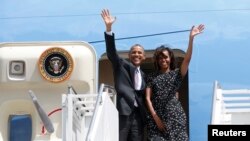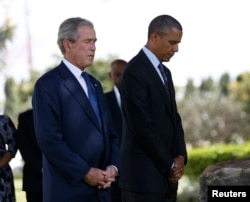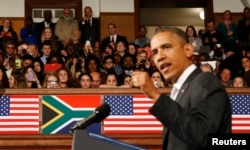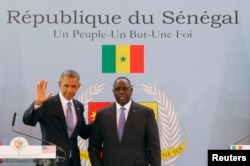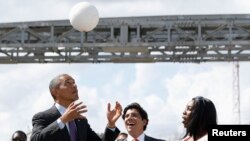DAR ES SALAAM —
U.S. President Barack Obama ended his Africa trip Tuesday, voicing confidence in Africa's future with help from a new U.S. model for development assistance.
In Tanzania, Obama and former U.S. president George W. Bush marked the 1998 al-Qaida terrorist bombing. Coordinated truck bomb attacks on the U.S. embassies in Dar es Salaam, and Nairobi, Kenya on August 7, 1998 left 224 people dead.
Just over three years later, al-Qaida attacked the United States directly on home soil on September 11, 2001.
In a brief ceremony at the new embassy building that opened in 2003, Obama and former president Bush laid a wreath at the memorial to those killed in the attacks.
With five family members of victims and those who survived the attack nearby, they walked side by side to the memorial, and bowed their heads for a moment of silence.
Obama's Africa trip has been focused primarily on enhancing trade and investment in the continent, based on a new model of aid, public-private partnerships with African governments and reforms.
But security threats faced by African nations, and the U.S. role in helping to counter extremist groups, were on the agenda in his discussions from Senegal to South Africa and Tanzania.
In South Africa, Obama spoke of what he called the “senseless terrorism that all too often perverts the meaning of Islam - one of the world’s great religions - and takes the lives of countless innocent Africans.”
He also attempted to counter the notion that the United States is militarizing its involvement in Africa, saying ultimately Africans must shoulder their own security responsibilities.
“I know there's a lot of talk of America’s military presence in Africa. But if you look at what we’re actually doing, time and again, we're putting muscle behind African efforts,” he said.
In the final event of his Africa trip, Obama visited a formerly idle power plant brought back to life through joint Tanzanian-U.S. efforts, highlighting his new initiative to double access to electricity in Africa.
Obama said this reflects his approach of combining public and private resources to spur economic progress.
He referred to other new initiatives, from agriculture to education and health, and said the United States intends to be a strong partner with Africa in years ahead.
“That is what all our efforts are going to be about, is making sure that Africans have the tools to create a better life for their people and that the United States is a partner in that process. It's going to good for Africa, it's going to be good for the United States and it's going to be good for the world,” he said.
Over a week of travel, Obama highlighted democratic progress and the importance of civil society and human rights in Senegal.
He held up South Africa's democratic transition and progress against HIV/AIDS as a model for Africa, met family members of critically ill former president Nelson Mandela, and underscored the role of Africa's youth in building the future.
As he left Tanzania he said he was inspired, and convinced that "with the right approach Africa and its people can unleash a new era of prosperity.”
In Tanzania, Obama and former U.S. president George W. Bush marked the 1998 al-Qaida terrorist bombing. Coordinated truck bomb attacks on the U.S. embassies in Dar es Salaam, and Nairobi, Kenya on August 7, 1998 left 224 people dead.
Just over three years later, al-Qaida attacked the United States directly on home soil on September 11, 2001.
In a brief ceremony at the new embassy building that opened in 2003, Obama and former president Bush laid a wreath at the memorial to those killed in the attacks.
With five family members of victims and those who survived the attack nearby, they walked side by side to the memorial, and bowed their heads for a moment of silence.
Obama's Africa trip has been focused primarily on enhancing trade and investment in the continent, based on a new model of aid, public-private partnerships with African governments and reforms.
But security threats faced by African nations, and the U.S. role in helping to counter extremist groups, were on the agenda in his discussions from Senegal to South Africa and Tanzania.
In South Africa, Obama spoke of what he called the “senseless terrorism that all too often perverts the meaning of Islam - one of the world’s great religions - and takes the lives of countless innocent Africans.”
He also attempted to counter the notion that the United States is militarizing its involvement in Africa, saying ultimately Africans must shoulder their own security responsibilities.
“I know there's a lot of talk of America’s military presence in Africa. But if you look at what we’re actually doing, time and again, we're putting muscle behind African efforts,” he said.
In the final event of his Africa trip, Obama visited a formerly idle power plant brought back to life through joint Tanzanian-U.S. efforts, highlighting his new initiative to double access to electricity in Africa.
Obama said this reflects his approach of combining public and private resources to spur economic progress.
He referred to other new initiatives, from agriculture to education and health, and said the United States intends to be a strong partner with Africa in years ahead.
“That is what all our efforts are going to be about, is making sure that Africans have the tools to create a better life for their people and that the United States is a partner in that process. It's going to good for Africa, it's going to be good for the United States and it's going to be good for the world,” he said.
Over a week of travel, Obama highlighted democratic progress and the importance of civil society and human rights in Senegal.
He held up South Africa's democratic transition and progress against HIV/AIDS as a model for Africa, met family members of critically ill former president Nelson Mandela, and underscored the role of Africa's youth in building the future.
As he left Tanzania he said he was inspired, and convinced that "with the right approach Africa and its people can unleash a new era of prosperity.”




